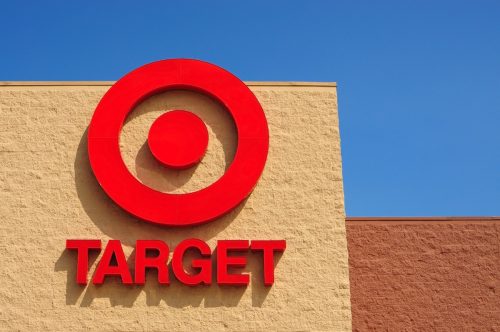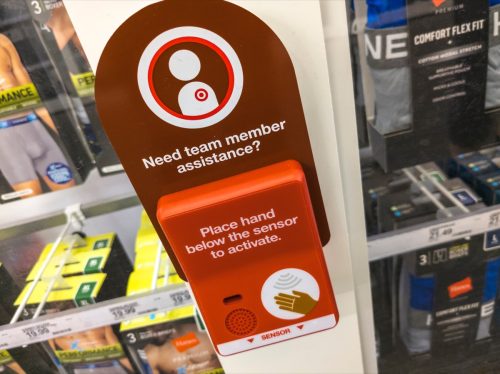Shoppers Are Abandoning Target, CEO Says—Here’s Why

While Target is a place that many of us head to when we want to “treat ourselves,” it also sells necessities. Similar to Walmart, you can get your groceries along with your cleaning supplies and seasonal items at Target, often at competitive prices. But now, the retailer’s CEO Brian Cornell warns that shoppers are spending less in stores—including on some typically essential items. Read on to find out why shoppers are abandoning Target.
RELATED: Shoppers Are Abandoning Costco, New Data Reveals—Here’s Why.
Cornell said customers are “buying less stuff.”

In a Nov. 2 interview with CNBC’s Becky Quick, Cornell spoke on the drop in spending at Target, not only with discretionary goods—which is likely expected—but also with necessities.
“They’re managing that budget really carefully and it’s certainly pressuring discretionary spending, they’re buying less stuff,” he said. “But even in food and beverage categories, over the last few quarters, the units, the number of items they’re buying, has been declining.”
Cornell didn’t elaborate on why exactly food and beverage is down, but he pivoted to discretionary spending on items such as home decor and toys, noting that both dollars and units have declined in this category over the past seven quarters. In response to Quick’s question about this representing a “goods recession,” Cornell agreed that the label is “really fair,” and stressed the need to look at different categories and how rising costs over the past several years are affecting customers.
RELATED: Shoppers Are Turning Away From Walmart—And Ozempic May Be to Blame.
Things have changed drastically since the pandemic.

Cornell explained that the situation now is much different than during the COVID-19 pandemic when customers were at home and nonstop buying.
The CEO added that Target was “chasing demand” at the time, but they knew that “wasn’t going to go on forever.” Speaking to this, as pandemic restrictions eased, demand slowed—and last year, Target was faced with a glut of the “wrong inventory,” CNBC reported. To avoid similar inventory challenges that can hit profits, Cornell said Target was more cautious this year.
“We’ve taken a much more conservative approach in planning inventory this year,” Cornell said during the interview, noting that customers still seem interested in buying items for different holidays. “But we’re going to lean into those big seasonal moments and play to win, when we know the consumer is looking for something that’s new, looking for affordability, looking for that special item for the holiday season.”
RELATED: Shoppers Are Abandoning Lowe’s, New Data Reveals—Here’s Why.
Target lowered profit expectations for 2023—and the latest numbers will be reported in the coming weeks.

While Cornell shed new light on consumer spending, this isn’t the first time this year he’s addressed the evident pullback.
Over the summer, Target’s sales were down by 5.4 percent compared with the same time last year, marking the first time the retailer saw a quarterly sales drop in six years.
The reports prompted Target to slash its sales and profit expectations in August—and during an earnings call that month, Cornell again highlighted a decrease in spending in “frequency categories” like food, beverage, and essentials due to inflation. Interestingly enough, however, CNBC also pointed out that Target made this decision amid economists arguing against a potential recession and pointing to data on slowing inflation.
According to CNBC, Target will report its third-quarter earnings on Nov. 15.
RELATED: Shopper Claims Target Is “Ripping Off People”—Here’s What to Check For.
Cornell also addressed retail theft.

While inflation has certainly pained American consumers, the rise of retail theft has also presented huge problems for retailers. According to the National Retail Federation, in 2022, the industry lost approximately $112 billion to retail crime.
During his CNBC interview, Cornell—who has been an open critic of the uptick in crime—discussed how this has affected Target. The retailer is one of many that has taken several preventive steps, including locking up merchandise and actively closing stores.
“We felt the need to use our voice to elevate awareness around this topic,” Cornell said, noting that he feels good about the progress that’s been made, including the INFORM Consumers Act that was passed earlier this year.
“Beyond the financial impact, I think there’s a societal impact here,” he said, also citing safety concerns for employees and customers. “You look at certain cities where jobs have been closing: Those jobs go away, the tax dollars are gone, but importantly, that local consumer doesn’t have access to the goods that they need. That impacts everyone in that community.”
RELATED: For more up-to-date information, sign up for our daily newsletter.